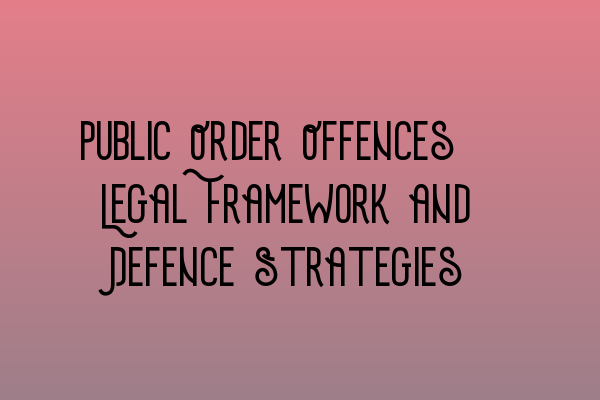Public Order Offences: Legal Framework and Defence Strategies
Public order offences are a serious matter, and understanding the legal framework surrounding these offences is crucial to mount a strong defence. In this blog post, we will discuss the various public order offences, the legal elements required to establish an offence, and strategies to defend against such charges.
Understanding Public Order Offences
Public order offences encompass a wide range of behaviours that disrupt or obstruct public order. These offences are governed by the Public Order Act 1986 and include offences such as disorderly conduct, affray, riot, and public nuisance.
One of the key elements in public order offences is the requirement for the behaviour to take place in a public place. It is essential to establish that the conduct or actions occurred in a public area, such as a street, park, or other public spaces, for the offence to be considered a public order offence.
Legal Elements of Public Order Offences
Each public order offence has specific legal elements that must be proven for a successful prosecution. It is crucial to understand these elements to form a robust defence strategy. Let’s discuss some commonly encountered public order offences:
- Disorderly Conduct: Disorderly conduct involves behaving in a manner that causes, or is likely to cause, harassment, alarm, or distress to others. The conduct can include abusive language, threatening behaviour, or engaging in violent actions. It is essential to evaluate the specific circumstances surrounding the alleged offence and challenge the prosecution’s evidence.
- Affray: Affray is a more serious public order offence that involves using or threatening violence towards others and causing a person present at the scene to fear for their safety. Understanding the precise circumstances and intent of the alleged affray is crucial to develop an effective defence strategy.
- Riot: A riot involves a group of three or more persons using or threatening violence towards others and causing serious public disorder. The prosecution must establish the presence of an assembly and the intention to use or threaten violence. Challenging the evidence and demonstrating lack of intent can be key defence strategies in riot cases.
- Public Nuisance: Public nuisance refers to any act or conduct that causes a common injury, annoyance, or inconvenience to the public. This offence can include obstructing public roads, blocking access to facilities, or creating excessive noise. Evaluating the impact of the alleged behaviour and challenging the evidence can form the basis of a strong defence.
Defence Strategies for Public Order Offences
When it comes to defending against public order offences, tailored defence strategies are crucial. Each case is unique, and an experienced criminal defence solicitor will assess the specific circumstances and evidence to build a strong defence. Here are some common defence strategies in public order cases:
- Lack of Intent: Challenging the prosecution’s ability to prove that the accused had the necessary intent to commit the offence can form a strong defence strategy. Demonstrating that the alleged actions were accidental, misinterpreted, or lacked the required intention can weaken the prosecution’s case.
- Self-Defence: In cases where the defendant’s actions were in response to a perceived threat, self-defence can be raised as a defence. It is essential to establish that the defendant acted reasonably and proportionately to protect themselves or others.
- Freedom of Expression: In certain public order offences, freedom of expression can be asserted as a defence. It is crucial to demonstrate that the accused’s actions were a legitimate exercise of their right to free speech and not intended to incite violence or hatred.
- Procedural Errors: Any procedural errors or violations of the defendant’s rights during the arrest, investigation, or trial can lead to the exclusion of evidence or even the dismissal of charges.
Mounting a successful defence against public order offences requires a thorough understanding of the legal framework, detailed case analysis, and skilled legal representation. If you are facing public order charges, it is crucial to consult with an experienced criminal defence solicitor who can assess your case and develop a tailored defence strategy.
For further assistance, SQE Criminal Law & Practice Law UK offers comprehensive SQE 1 Practice Exam Questions to help you prepare for your exams. Additionally, our SQE 1 Practice Mocks FLK1 FLK2 are designed to simulate the actual examination conditions. Visit our website to explore our SQE 2 Preparation Courses and SQE 1 Preparation Courses for a comprehensive study plan.
For up-to-date information on SRA SQE exam dates and related news, you can refer to our article on SRA SQE Exam Dates.
